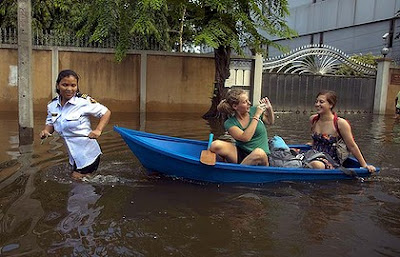
Smart Traveller is now smarter. At least, that's the idea now that the Department of Foreign Affairs and Trade (DFAT) has relaunched its travel advisory website, smartraveller.gov.au.
The Foreign Affairs Minister, KRudd, was on hand last week to spruik the new site, saying it would "help Australians make smart choices about where, when and how they travel overseas".
The old site has been streamlined (translation: had all the useless junk stripped out of it), there's now a dedicated mobile site, plus a DFAT Twitter feed and instructional videos on YouTube.
There's also a new ad campaign to go with the relaunch, urging Aussie travellers to "register, subscribe, insure" – as in, register your plans with Smart Traveller before leaving the country, subscribe to the website's updates, and get travel insurance.
All good advice. But just how useful is the website now?
I've criticised smartraveller.gov.au before, not least for its stupid spelling, which makes it Smart Raveller, or Smart Rave Ller – ie, not very smart at all – but also because its dire warnings of danger overseas too often sound like the kind of thing a hand-wringing parent might say, not an all-knowing government agency.
That's still going to be a problem.
But let's do the good stuff first. The new mobile website is a great idea, provided you have WiFi access overseas. With a few jabs of your finger you can have up-to-date advice on the country you're travelling in, plus addresses and map references of your nearest embassy should anything go wrong.
It also makes it easy to register your whereabouts if you decide to change your plans, or if there's a problem in the area you're travelling through.
The once ugly, unwieldy regular website has now been cleaned up, making it easier to quickly access the information you need.
It's all good. My only problem with Smart Traveller now is with some of the teeth-clattering warnings. There's some useful, sound advice on the site, but it's far from perfect.
Some of the information seems out of date. Thailand, for example, is listed as "exercise high degree of caution", and "reconsider your need to travel" in certain areas. That's largely due to the floods that have affected the country.
That information, however, was issued three weeks ago. Surely things might have changed slightly since then?
And some of the information seems overly frightening, if a little vague. Back in Thailand, there's a warning that "political demonstrations ... have resulted in fatalities in recent years. Firearms, grenades and small explosive devices have been used at various locations."
Right. Um, which locations again? (No mention of gun crime in the USA section though.)
Turkey, meanwhile, is listed as "exercise high degree of caution" largely due to a terrorist attack in Ankara last September. "Terrorist attacks can occur anywhere at any time in Turkey," Smart Traveller says. Yowser. Count me out.
Indonesia, too, currently has a code orange "reconsider your need to travel" slapped on it, citing more threats of terrorist attacks and other violence. Bali, in particular, is a "priority target" for terrorists, which is enough to put anyone off their Bintang.
The reality, however, is that plenty of travellers are visiting supposedly dangerous countries right now and not experiencing any problems, just as travellers are inevitably getting themselves robbed or bitten by wild animals or stuffed into jail cells in seemingly harmless countries.
Travel can be unpredictable like that. And I don't mean to play down the warnings on the site – this stuff is real. But it's not going to happen to everyone. Not even close.
That's where Smart Traveller's three steps – register, subscribe, insure – become great advice. It's an extra layer of protection for those choosing to go against the dire warnings of terrorist doom.
No comments:
Post a Comment